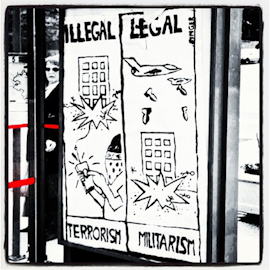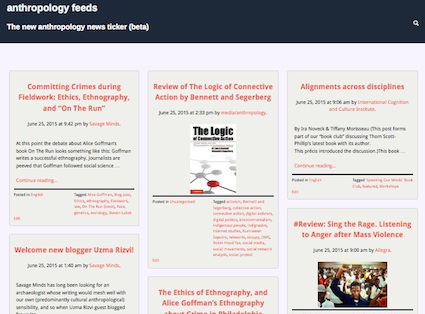(draft, post in progress) More surveillance, more bombs, more border controls, less democracy, less freedom: Europe is reacting hysterically after the deadly terror attacks in Paris one week ago. How to make sense of what is happening?
The deadly terror attack in France has brought, as anthropologist Jeremy Trombley at Struggle forever writes, "the violence that people around the world experience on a daily basis back into our own sheltered and secured lives. They remind us not only that the world is a violent place, but that, perhaps, our lives are peaceful because there is violence elsewhere."
People in Europe have during the recent days got the chance to get an inside view into the struggles of people in less priviledged countries that are regularily bombed by the West.
In theory there is a slight possibility for some kind of solidarity or cosmpolitanism to develop out of this, and a critique of Western policies.
The common discourse in mainstream media is - unsurprisingly - a totally different one.
Heather E. Young-Leslie was right when she two days after the attack wrote:
Sadly, l'horreur of Paris 13 Nov. 2015 will, probably, lead to greater political support for the hawks: the anti-Muslim, anti-immigrant, anti-refugee, pro-militaristic, pro-fascist and neo-Nazi elements in France and other parts of the EU. We will hear that it is necessary to relinquish freedoms in order to protect liberté, and solidarité will be purchased with rhetorics of anti-immigration and victim-blaming.
|
|
|
Double standards. Photo: ugocuesta, flickr
|
This natio-chauvinist "we" against "them" rethoric tends to silence cautious attempts to discuss the wider context of the terrorist attack, including the role of the West in creating terrorism, and the possibility that the operations by Western powers can be viewed as terrorism as well.
"Them", in the official discourse, not only refers to the Daesh/ISIS attackers but increasingly to all muslims and "non-western" refugees (like those who are escaping the madness i Syria) and immigrants and those who speak Arabic.
Anthropologists react
Several anthropologists, in their immmidiate reactions to the terror attack, insisted to focus on the wider global context of the terror attacks where the Western powers do bear some responsibilities.
Keith Hart, is writing from Paris, in his open letter to his daughter, first published on Facebook:
The fact is that the French killed 1 mn people in the Algerian war of independence, the second genocide they got away with (the other being Vichy). They have now made themselves the US' closest ally in bombing North Africa and the Middle East, invading Mali, Central African Republic etc. In radio discussions here no-one ever questions their right to do this.
Thomas Hylland Eriksen is reacting in a similar way. "The Syrian conflict, the rise of IS/Daesh, the flows of people out of the country and the reactions with which they are being met in Europe, the feeling of disenfranchisement and marginalisation prevalent among youths of North African origin in France, and the Western countries' active destabilisation of Iraq, Afghanistan and Libya cannot be seen independently of each other", he stresses:
[T]he value of human lives varies depending on where you live and who you are. This may be stating the obvious, but there is rarely if ever a major outrage in the rich countries when a drone attack or a missile targeting a terrorist leader instead ends up killing dozens of innocents, including children. Yet this happens routinely and frequently. Not everybody agrees that it is acceptable that the rich countries murder civilians in poor countries, and the Paris terrorist attack can thus be understood as an act of retribution.
Viewed from an subversive anthropological perspective, the distinction between good and bad guys, between terrorists and victims is not as clear as mainstream politicians suggest.
Terrorists or revolutionaries?
Maybe the term terrorist is not a very helpful one at all. Maybe we can get a better understanding of IS/Daesh when we call them - as anthropologist and terror researcher Scott Atram does - for revolutionaries.
In the Guardian he writes that treating Isis as a form of "terrorism" or "violent extremism" would mask the menace. Instead, he describes Isis as being part of a "dynamic, revolutionary countercultural movement of world historic proportions, with the largest and most diverse volunteer fighting force since the second world war".
In a fascinating interview om Russia Today, he explains the revolutionary aspects and even draws lines back to Hitler.
Sophie Shevardnadze, the interviewer,wonders how it can be possible that ISIS's horror brings them even more supporters. "Basically", she says, "what I am asking, is ISIS appealing to sick and disturbed people more than normal people?". The anthropologists answers:
No, it appeals to people in span of normal distribution. I mean, it's like any revolutionary movement, that's why I think even calling it terrorism or just extremism is beyond the pale. (..) It's very much like the French revolution, or even the Bolshevik revolution or even the National Socialist revolution... I mean, look at the French revolution, they were eating one another just like Al-Nusra and ISIS and other groups are eating one another like bloodied sharks, and they were invaded by a coalition of the Great Powers, and yet not only they survived, but they endured, and they introduced the notion of terror itself, as an "extreme measure" as they called it, "for the preservation of democracy", and every revolution since then, every real revolution has done pretty much the same thing, pretty much successfully, so ISIS is no exception.
(...) In any kind of truly revolutionary movement there's a feeling of invincibility once you've fused with your comrades in your cause. The idea is their history is on their side. So, even if they take battlefield losses, they're not going to consider that a loss at all.
ISIS sings the same tune Hitler did, promising Utopia in the end, the anthropologist says:
Look, George Orwell in his review of Adolf Hitler's "Mein Kampf" back in 1939 have described the essence of the problem. He said: "Mr. Hitler has discovered that human beings don't only want peace and security and comfort and free from want. They want adventure, glory and self-sacrifice, and Mr. Hitler's appealed to that - and while the Oxford student union at that time vowed to never fight again, Mr. Hitler has 80 million people fall down to his feet, in one of the most advanced countries in the world." How did that happen? Again, ISIS is appealing to the same sort of sentiments, that have been appealed to throughout human history... and no, I don't think we've learned much from history about that.
ISIS consists of young poeple, people in transition. ISIS, the interviewer suggests, might be seen as a form of teen rebellion then? The anthropologist agrees. It is - as most revolutionary movements, driven by young - and educated people, he says. But, the interviewer wonders, we're used to think that young people want freedom, but ISIS is forbidding this?
The anthropologist answers:
I got a call from head of Medical School telling me that her best students have just left to set up field hospital for ISIS in Syria, and she was asking me why would they do this; and I said, "because it's a glorious and adventurous mission, where they are creating a Brand New World, and they do it under constraints." I mean, people want to be creative under constraints. A lot of young people just don't want the kind of absolute freedom you're talking about. The choices are too great, there's too much ambiguity and ambivalence. There are too many degrees of freedom and so one can't chart a life path that's at all meaningful, and so these young people are in search of significance, and ISIS is trying to show them a way towards significance.
Again, we have to take it very seriously, that's why I think it's the most dynamic counter-cultural movement since WWII, and it's something I don't think people are taking seriously, just dismissing them as psychopaths and criminals and... this, of course, is something that we have to destroy. I think, we're on the wrong path in terms of the way we're going to destroy it.
So what is they way out of this? The first step is in Atran's view to understand this movement. Current counter-radicalisation approaches lack in his view the mainly positive, empowering appeal and sweep of Isis's story of the world, and the personalised and intimate approach to individuals across the world. What inspires the ISIS-fighters is not so much the Qur'an but "a thrilling cause that promises glory and esteem".
There are not many anthropologists who are conducting fieldwork among extremists like ISIS/Daesh. It's not just because it's dangerous, Atran says in an interview with Scientific American:
It's because human subjects reviews at universities and especially the [US] defence department won't let this work be done. It's not because it puts the researcher in danger, but because human subjects [research ethics] criteria have been set up to defend middle class university students. What are you going do with these kind of protocols when you talk to jihadis? Get them to sign it saying, "I appreciate that the Defense Department has funded this work," and by the way if you have any complaints, call the human subjects secretary? This sounds ridiculous and nothing gets done, literally.
(...)
Then you have crazy things [required by US funding bodies] like host country authorization. Suppose you want to do work in Israel and Palestine. So you go to the Israelis, say, "We want to do studies, just like we do in American universities" and say, "We need host country authorization from some government." They say, "Are you crazy?" And in many countries that are in chaos, who's going to give you permission?
PS: Maybe it might be fruiful to take a look at "On Suicide Bombing" by Talal Asad where he - among others - writes:
It seems to me that there is no moral difference between the horror inflicted by state armies (especially if those armies belong to powerful states that are unaccountable to international law) and the horror inflicted by its insurgents. In the case of powerful states, the cruelty is not random but part of an attempt to discipline unruly populations. Today, cruelty is an indispensable technique for maintaining a particular kind of international order, an order in which the lives of some peoples are less valuable than the lives of others and therefore their deaths less disturbing.
SEE ALSO:
Terror in Oslo: Who cares about Christian right wing extremism?
Mahmood Mamdani: "Western concern for Darfur = Neocolonialism"
How can anthropology help us understand Swat and Taliban?
Anthropologists: "It's time to kill the Osama bin Laden myths"
Militarisation of Research: Meet the Centre for Studies in Islamism and Radicalisation
Protests against British research council: "Recruits anthropologists for spying on muslims"
Engaged research = Terrorism: Germany arrests social scientists
Bush, "war of terror" and the erosion of free academic speech: Challenges for anthropology



Recent comments